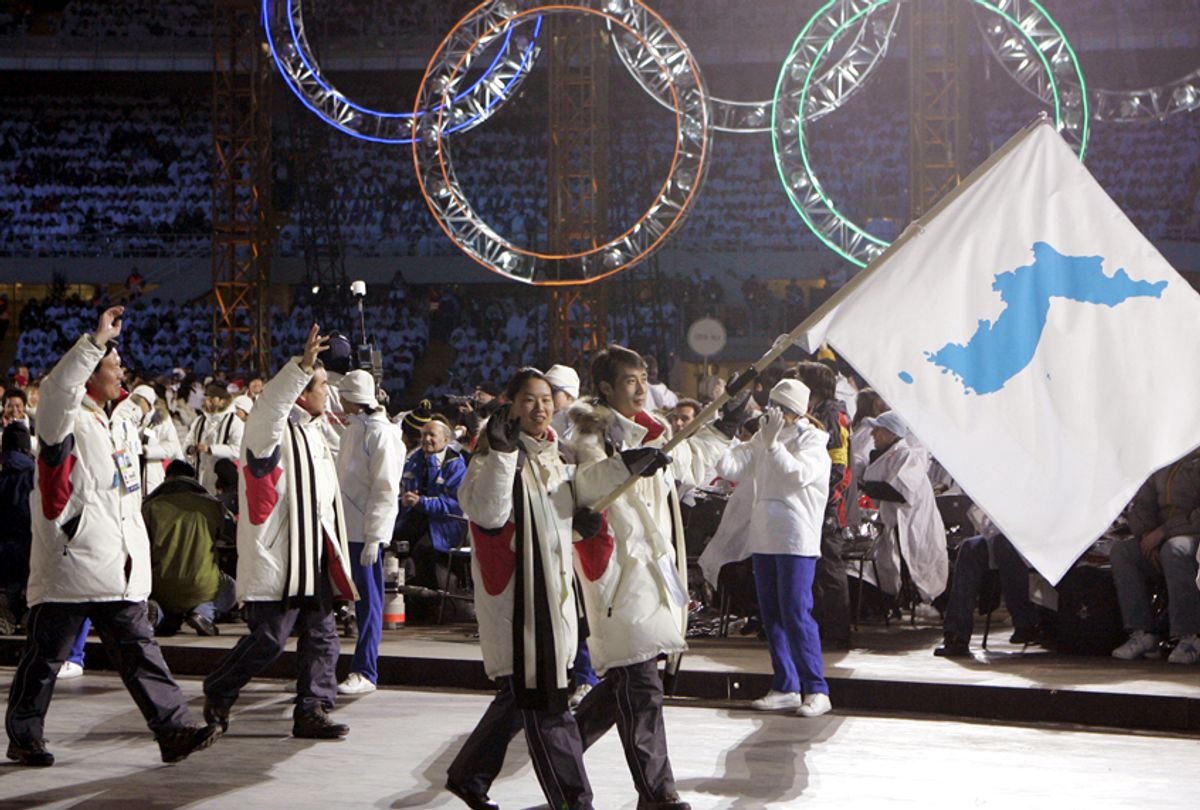North and South Korea have shaken hands on a diplomatic solution that will see the dictatorship send 22 athletes to this year’s Winter Olympic Games in Pyeongchang. The truce has sparked some protests but perhaps we can now enjoy this sporting mega-event, safe in the knowledge that the power of sport has drawn people together once again. But it’s not all good news for the Winter Olympics. In fact, the event — rather like a metaphorical ski-jumper — is rapidly heading towards a point of no return.
One issue is that sports mega-events can fuel nationalist sentiment and military action, as Russia’s hosting of the 2014 event perhaps proved. Notwithstanding such potential geopolitical problems, the event is beset by other problems too.
Arguably the most worrying thing is that, due to climate change, some observers are speculating the International Olympic Committee (IOC) is quickly running out of options for venues equipped to host the competition, a problem that European nations are compounding. Over the last few years, Germany, Norway and Poland have held referenda on bidding to host the Winter Olympics. Local populations all rejected the chance.
The reluctance of an increasing number of nations to bid for the Winter Games is unsurprising. Sports mega-events have become an increasingly expensive proposition, which many countries are unprepared to commit to. The 2014 Games in Sochi set the bar high. The US$51 billion budget made it the most expensive Olympics in history. South Korea’s spending of US$13 billion, although significantly lower, won’t do anything to assuage Western concerns that the Olympics are a costly game best played elsewhere.
An eastward shift
Concerns about the stand-off between the Koreas were thus as much a result of the Olympics’ shift eastwards as they were anything else. Following Sochi’s Black Sea hosting of the event, the Winter Games head next to Beijing — hardly a city one normally associates with skiing, bobsleighing or thriftiness.
Already, China has allocated a budget of US$9 billion just to construct a high-speed rail link to the mountains, let alone fund the development of venues. It is surely no surprise the traditional industrial heartlands of winter sports events are losing their stomach for them, yet it remains to be seen how sustainable the appetite of Asian nations will be for all things Alpine.
Even at the best of times, the Winter Olympics does not have the same kudos or appeal as the summer games or football’s World Cup. Ask yourself the question: what are the names of some of the highest profile athletes who will be competing in South Korea? The Winter Games does not have the equivalent of a Usain Bolt to grab people’s attention and keep the IOC’s cash tills ringing.
Indeed, one wonders how relevant to most people the event is. In attempts to account for the demands of a changing market, new sports such as snowboarding have been incorporated into the games. However, since 2014, the social and digital environment has changed dramatically and the number of millennial consumers has risen. All eyes will therefore be on the Olympic Channel, launched in 2016, to ensure one of the IOC’s most important properties remains fit-for-purpose and commercially viable.
Trust and integrity
Recent doping scandals won’t have helped in building trust and engagement among members of the public. Though the banning of Russia’s Olympic team from participating in Pyeongchang should help. Nevertheless, trust and integrity issues remain for the Olympics to contend with, exacerbated by the IOC’s apparent concessions to Russia, notably in allowing its “clean” squad members to compete under the banner of “Olympic Athlete from Russia”.
Cyber attacks
Once the world might have seen North Korea and its nuclear ambitions as the biggest threat to the upcoming games. But retaliatory cyber attacks from groups such as Russia’s Fancy Bears now appear much more likely at some stage. In fact, hacking of the Winter Olympics by “a nation state adversary that speaks Korean” has already been identified by McAfee.
Experts are already publicising their lists of which countries will secure the most medals. In the first global sports mega-event since the US elected Donald Trump as president, several countries will be looking to make a big impact.
Trump’s “Make America great again” agenda will demand a strong US performance, while China’s increasingly powerful President Xi will likewise be looking for his country’s athletes to flex their collective muscles in supporting his pursuit of “making China great again”. Even Great Britain, whose government has adopted the moniker “Sport is Great” has set its athletes a target of winning an unprecedented five medals. It’s a potentially toxic mix of competing national aspirations.
The Olympics and the World Cup have often been rather contentious affairs. Indeed, South Korea’s last hosting of the Olympics in summer 1988 is believed by many to have been a move designed to legitimise an authoritarian regime. This February, however, promises to be much more intriguing than even that.
Simon Chadwick, Professor of Sports Enterprise, University of Salford



Shares